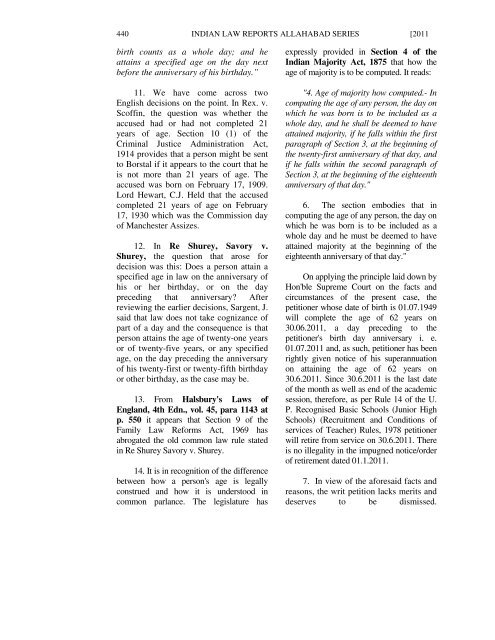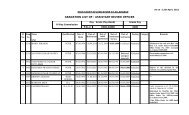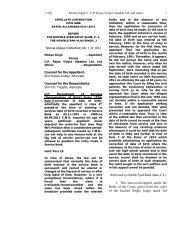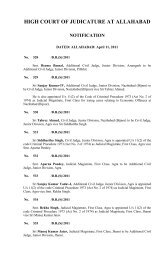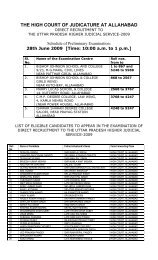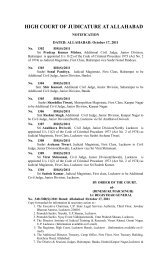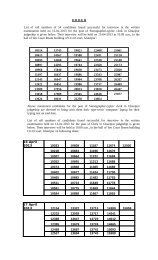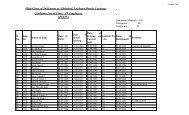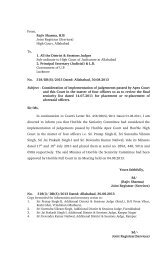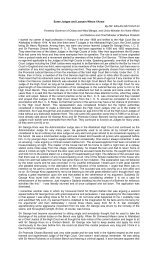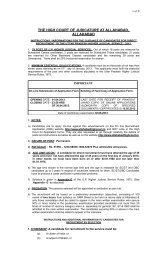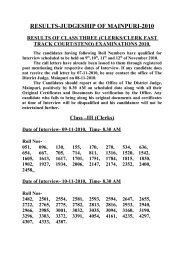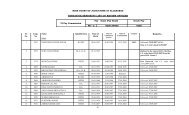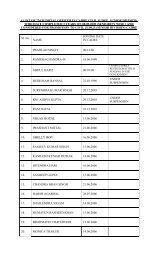Apr - High Court of Judicature at Allahabad
Apr - High Court of Judicature at Allahabad
Apr - High Court of Judicature at Allahabad
You also want an ePaper? Increase the reach of your titles
YUMPU automatically turns print PDFs into web optimized ePapers that Google loves.
440 INDIAN LAW REPORTS ALLAHABAD SERIES [2011<br />
birth counts as a whole day; and he<br />
<strong>at</strong>tains a specified age on the day next<br />
before the anniversary <strong>of</strong> his birthday.”<br />
11. We have come across two<br />
English decisions on the point. In Rex. v.<br />
Sc<strong>of</strong>fin, the question was whether the<br />
accused had or had not completed 21<br />
years <strong>of</strong> age. Section 10 (1) <strong>of</strong> the<br />
Criminal Justice Administr<strong>at</strong>ion Act,<br />
1914 provides th<strong>at</strong> a person might be sent<br />
to Borstal if it appears to the court th<strong>at</strong> he<br />
is not more than 21 years <strong>of</strong> age. The<br />
accused was born on February 17, 1909.<br />
Lord Hewart, C.J. Held th<strong>at</strong> the accused<br />
completed 21 years <strong>of</strong> age on February<br />
17, 1930 which was the Commission day<br />
<strong>of</strong> Manchester Assizes.<br />
12. In Re Shurey, Savory v.<br />
Shurey, the question th<strong>at</strong> arose for<br />
decision was this: Does a person <strong>at</strong>tain a<br />
specified age in law on the anniversary <strong>of</strong><br />
his or her birthday, or on the day<br />
preceding th<strong>at</strong> anniversary After<br />
reviewing the earlier decisions, Sargent, J.<br />
said th<strong>at</strong> law does not take cognizance <strong>of</strong><br />
part <strong>of</strong> a day and the consequence is th<strong>at</strong><br />
person <strong>at</strong>tains the age <strong>of</strong> twenty-one years<br />
or <strong>of</strong> twenty-five years, or any specified<br />
age, on the day preceding the anniversary<br />
<strong>of</strong> his twenty-first or twenty-fifth birthday<br />
or other birthday, as the case may be.<br />
13. From Halsbury's Laws <strong>of</strong><br />
England, 4th Edn., vol. 45, para 1143 <strong>at</strong><br />
p. 550 it appears th<strong>at</strong> Section 9 <strong>of</strong> the<br />
Family Law Reforms Act, 1969 has<br />
abrog<strong>at</strong>ed the old common law rule st<strong>at</strong>ed<br />
in Re Shurey Savory v. Shurey.<br />
14. It is in recognition <strong>of</strong> the difference<br />
between how a person's age is legally<br />
construed and how it is understood in<br />
common parlance. The legisl<strong>at</strong>ure has<br />
expressly provided in Section 4 <strong>of</strong> the<br />
Indian Majority Act, 1875 th<strong>at</strong> how the<br />
age <strong>of</strong> majority is to be computed. It reads:<br />
"4. Age <strong>of</strong> majority how computed.- In<br />
computing the age <strong>of</strong> any person, the day on<br />
which he was born is to be included as a<br />
whole day, and he shall be deemed to have<br />
<strong>at</strong>tained majority, if he falls within the first<br />
paragraph <strong>of</strong> Section 3, <strong>at</strong> the beginning <strong>of</strong><br />
the twenty-first anniversary <strong>of</strong> th<strong>at</strong> day, and<br />
if he falls within the second paragraph <strong>of</strong><br />
Section 3, <strong>at</strong> the beginning <strong>of</strong> the eighteenth<br />
anniversary <strong>of</strong> th<strong>at</strong> day."<br />
6. The section embodies th<strong>at</strong> in<br />
computing the age <strong>of</strong> any person, the day on<br />
which he was born is to be included as a<br />
whole day and he must be deemed to have<br />
<strong>at</strong>tained majority <strong>at</strong> the beginning <strong>of</strong> the<br />
eighteenth anniversary <strong>of</strong> th<strong>at</strong> day."<br />
On applying the principle laid down by<br />
Hon'ble Supreme <strong>Court</strong> on the facts and<br />
circumstances <strong>of</strong> the present case, the<br />
petitioner whose d<strong>at</strong>e <strong>of</strong> birth is 01.07.1949<br />
will complete the age <strong>of</strong> 62 years on<br />
30.06.2011, a day preceding to the<br />
petitioner's birth day anniversary i. e.<br />
01.07.2011 and, as such, petitioner has been<br />
rightly given notice <strong>of</strong> his superannu<strong>at</strong>ion<br />
on <strong>at</strong>taining the age <strong>of</strong> 62 years on<br />
30.6.2011. Since 30.6.2011 is the last d<strong>at</strong>e<br />
<strong>of</strong> the month as well as end <strong>of</strong> the academic<br />
session, therefore, as per Rule 14 <strong>of</strong> the U.<br />
P. Recognised Basic Schools (Junior <strong>High</strong><br />
Schools) (Recruitment and Conditions <strong>of</strong><br />
services <strong>of</strong> Teacher) Rules, 1978 petitioner<br />
will retire from service on 30.6.2011. There<br />
is no illegality in the impugned notice/order<br />
<strong>of</strong> retirement d<strong>at</strong>ed 01.1.2011.<br />
7. In view <strong>of</strong> the aforesaid facts and<br />
reasons, the writ petition lacks merits and<br />
deserves to be dismissed.


